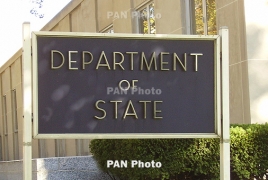U.S.: Joint Armenia-Azerbaijan statement a “positive sign” November 9, 2022 - 13:17 AMT PanARMENIAN.Net - The United States believes that Armenia and Azerbaijan issuing a joint statement after a ministerial meeting in Washington is a “positive sign”, Department of State spokesperson Ned Price told a briefing on Tuesday, November 8. Ministers of Foreign Affairs of Armenia and Azerbaijan Ararat Mirzoyan and Jeyhun Bayramov held a meeting on Monday and were joined by Secretary of State Antony Blinken. “I think it’s important to note first that following Secretary Blinken’s meeting with his two counterparts – his Armenian and his Azerbaijani counterpart yesterday – the two countries issued a joint statement. That statement, their statement – I will point out that it is longer than our readout – it’s available on the Armenian and the Azerbaijani government websites,” Price said. “Now, we don’t try to make too much of joint statements, but a joint statement in the context of these two countries is something to take note of. It’s a very positive sign that these two countries could agree to not only issue a joint statement but to agree on the substance behind it.” Price said the foreign ministers agreed to expediate their negotiations and to organize another meeting in the coming weeks. “I should note that Secretary Blinken was involved in the discussions, but there were opportunities throughout the course of the day for the two sides to meet and to attempt to bridge their differences, in some cases without the United States as an active participant. We remain committed to promoting a peaceful future for the South Caucasus region. We believe that continued direct dialogue is key to resolving issues and to reaching a lasting peace,” the spokesperson said. “I think going back to your original question, our role in this has been one of facilitator. We provided, over the course of the day yesterday, a space – Blair House, in this case – for the two countries to come together, just as we did in New York a few weeks ago in late September. But this is not an agreement that the United States is attempting to or seeking to – or even can – impose on the two sides. What we are doing is trying to create a space and an opportunity for the two sides to come together, to identify their differences – of which there are many – and to attempt to bridge them.| Price said the meeting was also positive positive in that the two sides met, they surfaced many of their areas of disagreement. He said they were able to agree to continue meeting and engaging in direct dialogue and diplomacy in the weeks that follow. “But it is not for us to prescribe what this lasting comprehensive peace between the two countries might look like. We are not presenting them with a document that is ready to sign. We are doing everything we can to help enable the diplomacy that they themselves will need to undertake – and this is not unlike our approach to a number of challenges around the world, where we’ve demonstrated the viability and the effectiveness of this model. The historic agreement that was reached between Israel and Lebanon just a couple of weeks ago – the United States played the role of facilitator, played the role of mediator, but of course we weren’t dictating the terms,” . “The fact that the two parties have continued to engage, that itself is a real step. That is actually a step that we hope in the coming weeks will continue to allow the parties to build on the momentum that they have been able to sustain since the outbreak of hostilities. There have, of course, been setbacks. But we believe that if they continue down the path of dialogue and diplomacy, they’ll be able to build on that momentum, they’ll be able to build confidence between them, trust between them, and we will do everything we can to support those processes so that they’re able to reach that comprehensive and lasting peace. Six total incidents have burned 19 old-growth trees. Friday night 8 trees were torched along the beautiful main entrance. The EU does not intend to conduct military exercises with Armenia, Lead Spokesperson for EU Foreign Affairs and Security Policy Peter Stano says. Hikmet Hajiyev has said that there is no place for USAID operation in Azerbaijan any longer. A telephone conversation between Putin and Pashinyan before the CSTO summit is not planned, Peskov says. Partner news |